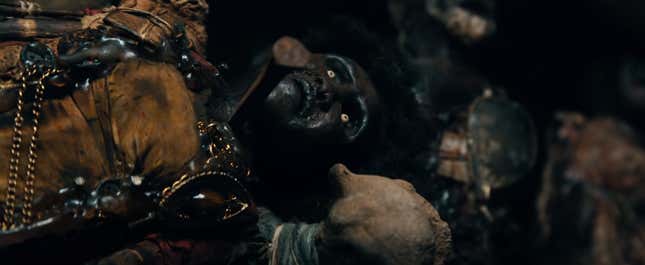
Paramount Pictures’ Spell—from director Mark Tonderai—is a film that sets out to exist in a number of emotional spaces while terrifying you with a story about how simultaneously horrific and freeing homecomings can be. While the film doesn’t quite accomplish all of its goals, it does manage—perhaps accidentally—to be a wildly fun horror flick centering one hell of a bewitching villain.
Spell sets the stage by bringing you face to face with the lasting childhood trauma that high-powered layer Marquis Woods (Omari Hardwick) struggles to deal with, years after leaving his hometown located somewhere in remote West Virginia. In Marq’s dreams, he’s haunted by visions of his father (Ri-Karlo Handy), who attacks and demeans him for having left his family behind in the mountains. In his waking hours, he works hard to remind everyone that he left the country behind in search of a life in the city that, in his mind, defined true success.
Through somewhat clunky dialogue and an odd assortment of interactions, Spell tells you, but doesn’t exactly show you, that Marq loves the nuclear family that he and his wife Veora (Lorraine Burroughs) have built for themselves. The pair adore their children Tydon (Kalifa Burton) and Samsara (Hannah Gonera), neither of whom are given much characterization in the film other than being Teens™. Together, they’re the sort of picture of upper-middle-class stability you’d expect to see in a car commercial. But in a handful of rather heavy-handed moments—like when Marq “jokingly” lets Veora be locked in their room, and when you see that Marq’s not the most scrupulous lawyer—Spell first hints at the darkness that’s in store for the Woods family. When the man receives word of his father’s sudden death, he’s devastated, but resolves to return to his familial home for the funeral, and reasons that it would be best for the children to see where their people come from in order to better appreciate the privilege they have.
There’s a decided self-seriousness to Spell’s first third or so that, when coupled with the core cast’s glaring lack of chemistry, makes the film seem like it might not have the necessary elements to get anywhere interesting. But as the Woods family clambers into a single-engine jet to fly off into the wilderness in order to journey to Marq’s hometown, Spell begins to shift into a properly unsettling space and its characters begin making the kinds of dumb, but entertaining choices you expect in a horror film.

When Marq and his family touch down at a remote gas station to refuel, he callously disregards the owner’s offerings for protective herbs and salts. It’s what locals use to ward off curses, hexes, and other mystical ailments Marq refuses to put faith in. More than Marq simply not believing in the Appalachian hoodoo, Spell wants you to know that the character outright rejects it, and in that rejection that movie telegraphs its first major plot development that actually makes it movie worth watching.
A tragic, but wholly expected series of events brings Marq (but not his family) deep into the foothills, where he awakes in the home of Eloise (Loretta Devine), a local healer who takes him in to tend to wounds that have left him badly injured. Alarmed and largely unable to move, the one thing on his mind throughout most of Spell is figuring out where his family is and how to get them all back home. But while Marq may be the story’s protagonist, it’s very much Eloise’s movie thanks in no small part to Devine’s deliciously unhinged and often haunting performance that immediately evokes both Kathy Bates’ Annie Wilkes in Misery and Diahann Carroll’s Elzora in Eve’s Bayou.
Where Marq and Veora often come across as people who don’t really know one another, Eloise and her husband Earl (John Beasley) have an uncanny rapport that is at once kindly ma and pa, and also sorceress and henchman. The dreamlike way that Marq comes to know the woman quickly turns into a feeling of fear, as he begins to suspect she might be keeping him against his will and lying to him regarding the whereabouts of his family. Infirmed the way he is, Marq can only do but so much to resist Eloise’s care as he heals, but the more time he spends in her home, gradually learning more about her, the more he realizes just how imperiled his life might actually be.
Spell isn’t an outright scary movie so much as it is a movie that wants to make you cringe by brutalizing its character’s bodies in ways that might make you flinch out of sympathy. Dry as Hardwick’s exchanges with other actors tend to be, he sells the pain Marq is subjected to with stunning effect that only serves to make the plot revelations that much more stomach-turning as the story progresses. Interestingly, Spell makes clear very early on that Eloise is known to be a rootworker—a practitioner of Appalachian folk magic—who’s revered by the community for her ability to cure people of a wide variety of ailments. The movie leaves no doubt that the power Eloise has is real because that’s not exactly what it wants you to fear about her.

Because Marq is from a community similar to Eloise’s, there’s a kind of kinship between the two of them that she’s eager to acknowledge but he isn’t. That tension is ultimately what Spell wants to make some sort of statement about, though it fails spectacularly to do so. At multiple points throughout the film, upwardly mobile, economically secure, lighter-skinned Black people are presented as being victims of violence at the hands of impoverished, darker-complected hillfolk who have an unwavering belief in a power that many people would consider silly superstition. Central to Marq’s struggle throughout the film is his wrestling with the fact that Eloise and her town are part of his heritage, but Spell lacks both the clarity of story and emotional depth to really explore that idea to any real extent.
In one scene where Marq tries to psychoanalyze Elosie’s beliefs, she counters by pointing out that the people in her community don’t have Obamacare. It could have been a moment of genuine reflection on the larger evils of class inequality in America, but instead it lands like a lazy joke using poor people to take political potshots. In the end, Spell treats those living in the mountains like little more than Deliverance-esque caricatures, and in doing so, makes it seem as if the filmmakers are just as judgmental about them as Marq is. It feels worth noting that while Spell’s attempting to tell a very specific story about Black Americans, the movie’s writer Kurt Wimmer (Salt, Ultraviolet) is a white man. That’s not to say it isn’t possible for screenwriters to craft stories about people unlike themselves, but here it very much feels like Wimmer was either unable or uninterested in working in anything beyond lazy stereotypes.
What Spell does have going for it—besides Devine’s performance—is an ample amount of gorgeous cinematography and an evocative, otherworldly atmosphere that Tonderai achieves through a clever use of unnaturally lit night shots that turn the woods into a nightmare bathed in neon. As Spell builds to its climax, the movie does away with any pretense of being anything but a schlocky scarer, and the movie’s better off for it, because while it definitely doesn’t work as “elevated” horror, it makes for the perfect sort of movie you put on to be grossed out, a little unsettled, and maybe have an unexpected laugh or two at.
Spell hits various video on demand platforms on October 30.
Update 10/29/2020, 5:00 p.m. ET: An earlier version of this piece did not include Spell’s release date. Now it does.
For more, make sure you’re following us on our Instagram @io9dotcom.